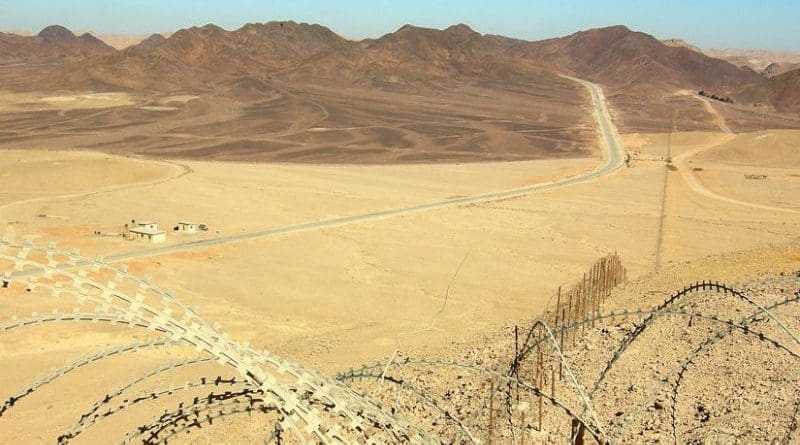Day of Departure, Day of Reckoning – OpEd
By Jeremy Salt
The news that Omar Sulaiman had a hot line to the Israeli government, that he was Israel’s choice as president, even over Mubarak, and that he invited Israel to invade Sinai if it thought it could stop arms smuggling to Gaza, should surprise noone, but these revelations from the Wikileaks cables underline the rottenness of the Egyptian regime and the need to replace it without delay and without qualification.
The businessmen and politicians who have amassed immense wealth are inextricable parts of the same ruling class. They will hang on to power until the bitter end because of their property and because of the revelations already spilling into the public about their wealth, their means of acquiring it and their business partners in Israel and the US. Some have already fled. Those who have stayed – and some cannot leave now because of travel bans issued as a ‘concession’ to the protesters – are likely to face prosecution and lose their wealth. They are the equivalent of Sadat’s ‘fat cats’ except they are probably even fatter but they are all part of the regime and the system the US is determined to preserve, whatever Obama and Clinton say in public about meeting the ‘hopes and aspirations’ of the Egyptian people. Central to their thinking is Israel. An independent Egypt will have no problems in dealing with the US except for Israel, and on this question a separation from the policies of the past three decades is inevitable.
This has nothing do with the Muslim Brotherhood. It is question of the ‘hopes and aspirations’ of the Egyptian people above and beyond their immediate material needs. The removal of Egypt from the Arab camp and the ‘confrontation states’ during the Sadat presidency was Israel’s greatest strategic victory since 1948. It opened the doors to the invasion of Lebanon in 1982, and the accelerated devastation of Palestine life in Gaza and the West Bank. Protected by the treaty with Egypt Israel did whatever it wanted whenever it wanted. Egypt – the largest and most populous state – sat by through every atrocious action but now that period is coming to an end. No democratically elected Egyptian government will maintain the policies of the Mubarak government vis-a-vis Israel and the Palestinians. The wall around Gaza will come down. That will be a first step. The ‘peace’ treaty with Israel may or may not be scrapped but the immunity that has allowed Israel to go on the rampage since the ‘peace’ treaty was signed in 1979 will have gone for good if the Egyptian revolution can be sustained until the regime is brought down.
This is why, despite the ringing declarations of Obama and Clinton, the US is determined to derail it. Behind the US stands Israel, issuing demands and instructions which Obama obediently follows. The moment could not be more historic. Egypt is at a crossroads and with it the rest of the Middle East. There is no revolution in modern Arab world history to compare with this one. The Egyptian revolution of 1919 was a people’s revolution but far smaller in scale. The revolution of 1952 was carried out by army officers, as was the revolution in Iraq in 1958 and in Libya in 1969. They were proclaimed in the name of the people, and in Nasser’s case at least were enthusiastically supported by the people but they were not fashioned by the people, from the ground up.
The US calls for democracy in Egypt when democracy is antithetical to its purposes. This is an old story. Substitute civilisation, liberation and freedom for democracy and you have the story of ‘western’ intervention in the 19th century as well. The discourse has always been a double one. The Middle East had to be controlled one way or the other. Maybe through brute force, maybe through mandates, maybe through economic dependency, maybe through threats, maybe through bribery but at all costs its potential power had to be harnessed. That is the central principle that has governed ‘western’ policies in the Middle East from the beginning of the 19th century until now.
The problem for the ‘west’ is that it is rapidly coming to the end of its half millennium of world domination. The world is going its own way whatever the US thinks. Latin America is ‘lost’. In the country of the Monroe Doctrine this would have been unthinkable three decades ago, when Mubarak was settling into power, but one by one the Latin American states are breaking free of the linked shackles of the IMF and the US government. The US no longer has the capacity to arrest this trend. It is bleeding in Afghanistan, it has exhausted itself in Iraq (at immensely greater cost to the Iraqi people) and it has enormous problems at home. Now it seems that the Middle East is also on the brink of being ‘lost’. The word is interesting because it implies the right of possession and that is exactly how the ‘west’ has thought ever since Napoleon stepped ashore in Egypt in 1798. But the Middle East does not belong to the ‘west’ or even to its governments. It belongs to its people and that is the precise message the world is now hearing from Tahrir Square.
– Jeremy Salt is associate professor in Middle Eastern History and Politics at Bilkent University in Ankara, Turkey. Previously, he taught at Bosporus University in Istanbul and the University of Melbourne in the Departments of Middle Eastern Studies and Political Science. Professor Salt has written many articles on Middle East issues, particularly Palestine, and was a journalist for The Age newspaper when he lived in Melbourne. He contributed this article to PalestineChronicle.com.

